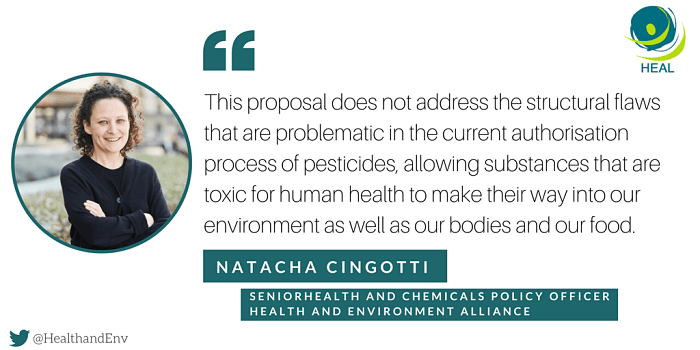The EU’s proposed 2040 climate target to reduce domestic emissions by 90% - while allowing up to 3% to be met through international carbon credits – risks undermining health protections. The Health and Environment Alliance calls on member states to strengthen their climate commitments in order to protect health, rather than delay and weaken overdue action.
Brussels, 13 April 2018 – In response to the European Citizens’ Initiative (ECI) “Stop Glyphosate” initiated by a broad coalition of civil society groups including HEAL and signed by more than one million citizens [1], the European Commission published a legislative proposal aiming at increased transparency, accountability and sustainability of the risk assessment process in the food chain transparency and risk assessment process under the General Food Law on 11 April 2018 [2]. The proposal only addresses a small part of the concerns raised in the ECI and falls short of meeting HEAL’s expectations.
The first request of the ECI – “Ban glyphosate-based herbicides, exposure to which has been linked to cancer in humans, and has led to ecosystems degradation” – was clearly not addressed since glyphosate was reauthorized onto the EU market for another five years without any restrictions on its use [3].
The ECI’s second request was to “ensure that the scientific evaluation of pesticides for EU regulatory approval is based only on published studies, which are commissioned by competent public authorities instead of the pesticide industry”. However the legislative initiative on the table from the European Commission falls short of properly addressing those EU citizens’ demands. Moreover, a 2016 European Court ruling already highlighted that greater transparency should be granted in the context of the current legislative framework, including by making information from safety tests on pesticides and potentially harmful chemicals available to the public.
Despite a few measures having the potential to marginally increase transparency – for example the long overdue creation of a common European Register of commissioned studies about substances that are subject to the authorisation system under the law – the legislative initiative ignores the core fundamental principles enabling transparency as requested by the ECI, and it actually proposes measures that go against them:
The ECI requested for full transparency of the scientific data. The proposal (amending article 39 of the General Food Law) grants confidentiality for information needed to assess the quality and robustness of the data submitted to EU regulatory bodies on the safety on an active substance.
The ECI requested that studies which assess the safety of pesticides should no longer be commissioned by those with a very clear vested interest in their outcome and that the overall costs of the pesticide authorisation process should continue to be paid by industry. The proposal still tasks industry to conduct the studies required under the EU regulatory framework and even suggests (recital 22) that public money from EU taxpayers could be legally spent by EFSA to commission studies on the products sold by private companies. Considering the huge profits generated by the sales of such products, we believe that industry should have to bear the costs of ALL studies that have to be performed to test the toxicity of the products they intend to put on the market. While we welcome an increase of financial capacities for EFSA to carry out its duties in a proper way, such an increase should be dedicated to improving the expertise of the agency’s staff and other resources.
Natacha Cingotti, Senior Chemicals and Health Policy Officer at HEAL said: “This proposal does not address the structural flaws that are problematic in the current practice of the authorisation process of pesticides, allowing substances that are toxic for human health to make their way into our environment, bodies and food, causing long-term and irreversible diseases that could be prevented.”

HEAL will continue to advocate on the public health advantages of reducing toxic pesticides in farming across Europe, support affected farmers suffering from health problems [5], engage in national campaigns to restrict their use, and promote independent scientific research about the adverse health and environment effects of such toxic substances. HEAL will also actively follow the outcome of an ongoing case at the European Court of Justice [6], whereby the Court has been asked to assess whether the current risk assessment process for pesticides respects the precautionary principle in order to properly protect human health and the environment.


